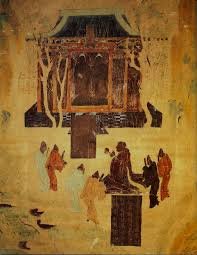Perceptions
Emperor Ashoka

Perceptions
The use of Buddhist sources in reconstructing the life of Ashoka has had a strong influence on perceptions of Ashoka, as well as the interpretations of his Edicts. Building on traditional accounts, early scholars regarded Ashoka as a primarily Buddhist monarch who underwent a conversion to Buddhism and was actively engaged in sponsoring and supporting the Buddhist monastic institution. Some scholars have tended to question this assessment. The only source of information not attributable to Buddhist sources are the Ashokan Edicts, and these do not explicitly state that Ashoka was a Buddhist. In his edicts, Ashoka expresses support for all the major religions of his time: Buddhism, Brahmanism, Jainism, and Ajivikaism, and his edicts addressed to the population at large (there are some addressed specifically to Buddhists; this is not the case for the other religions) generally focus on moral themes members of all the religions would accept.
However, there is strong evidence in the edicts alone that he was a Buddhist. In one edict he belittles rituals, and he banned Vedic animal sacrifices; these strongly suggest that he at least did not look to the Vedic tradition for guidance. Furthermore, there are many edicts expressed to Buddhists alone; in one, Ashoka declares himself to be an upasaka, and in another he demonstrates a close familiarity with Buddhist texts. He erected rock pillars at Buddhist holy sites, but did not do so for the sites of other religions. He also used the word dhamma to refer to qualities of the heart that underlie moral action; this was an exclusively Buddhist use of the word. Finally, the ideals he promotes correspond to the first three steps of the Buddhas graduated discourse.
 Battle of Kalinga
Battle of Kalinga Policy
Policy Early Life
Early Life Legacy of Ashoka
Legacy of Ashoka Death of Ashoka
Death of Ashoka Exile
Exile Great Public Works Projects
Great Public Works Projects The Life of Ashoka the Great
The Life of Ashoka the Great The First Buddhist King
The First Buddhist King The Battle of Kalinga
The Battle of Kalinga Accession to the Throne
Accession to the Throne Equality for All
Equality for All Test your English Language
Test your English Language  Benefits of Mangosteen
Benefits of Mangosteen Wacky Ideas to attract your Partner
Wacky Ideas to attract your Partner New Years Makeup Ideas
New Years Makeup Ideas Precautions while using ATM Machines
Precautions while using ATM Machines Atal Bihari Vajpayee
Atal Bihari Vajpayee Healthy Arms
Healthy Arms Weird Plants
Weird Plants SuperFood
SuperFood The Most Romantic Train Journeys
The Most Romantic Train Journeys




